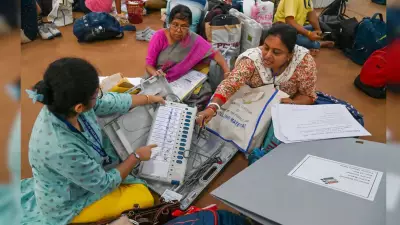
As exit polls predict a potential landslide victory for Nitish Kumar and the NDA coalition in Bihar, political experts are analyzing the key factors behind this anticipated outcome. Professor Sanjay Kumar from the Centre for the Study of Developing Societies (CSDS), a leading authority on India's electoral politics, has decoded the elements that may have shaped the voter sentiment in this crucial state.
The Coalition Advantage: Arithmetic That Adds Up
According to Professor Kumar's analysis, the NDA's coalition arithmetic appears significantly more cohesive than previous elections. The strategic alliance between different political parties within the NDA fold has created a unified front that resonates with Bihar's diverse electorate. This cohesion has potentially prevented the fragmentation of votes that often characterizes Bihar's complex political landscape.
Professor Kumar, who has spent decades studying how shifts in caste, class, and gender transform India's democratic map, emphasizes that coalition politics in Bihar has evolved beyond mere seat-sharing arrangements. The NDA's ability to present a united front while addressing regional concerns has become a crucial factor in their projected success.
Women Voters and Welfare Schemes: The Game Changers
One of the most significant revelations from the exit poll analysis points to Nitish Kumar's substantial edge among women voters. The Bihar Chief Minister's focus on women-centric welfare schemes and development programs appears to have resonated strongly with female electorate across the state.
The increased participation of women voters, coupled with their apparent preference for the ruling coalition, marks a deeper social transformation in Bihar's political dynamics. Professor Kumar notes that this surge in women's political engagement reflects changing social attitudes and the effectiveness of targeted welfare initiatives that directly impact women's lives and livelihoods.
Cleaner Voter Rolls and Evolving Caste Equations
The Statewide Intensive Revision (SIR) of electoral rolls has emerged as another critical factor in the NDA's projected performance. This comprehensive exercise to clean up voter lists has potentially created a more accurate representation of the electorate, eliminating duplicate entries and ensuring that only legitimate voters participate in the democratic process.
Professor Kumar's analysis also highlights the evolving caste equations on the ground. The fragmentation of OBC politics and the emergence of new social alliances have created opportunities for political parties to craft innovative strategies that transcend traditional caste boundaries. The NDA's ability to navigate these complex social churns while maintaining its core support base appears to have worked in its favor.
The combination of welfare schemes, aspirational politics, and strategic social engineering has created a potent mix that may have tilted the balance in favor of the ruling coalition. As Professor Kumar explains, today's Bihar voters are increasingly making choices based on both immediate welfare benefits and long-term development aspirations.





